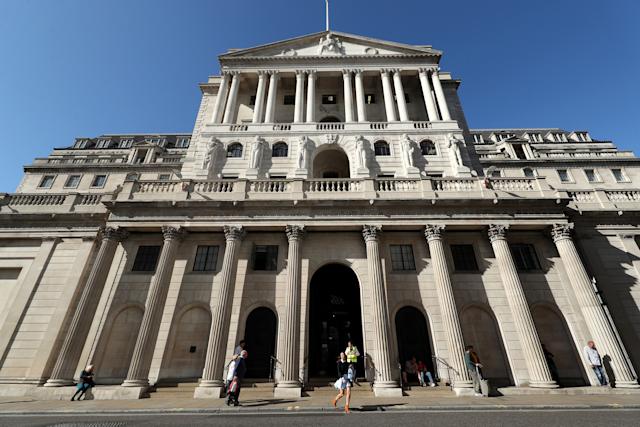British government bond prices soared on Wednesday after the Bank of England said it would buy long-dated bonds in an effort to bring calm to the market and shelved plans to sell its stock of gilts for the time being.
Finance minister Kwasi Kwarteng set out a new economic agenda last week, sparking a historic slide in sterling markets that sent the pound to an all-time low against the U.S. dollar, just above $1.03.
Having failed to cool a sell-off with verbal interventions over the previous two days, the BoE announced an emergency move that it said would prevent the turmoil in markets from spreading through the country and seizing up credit flows.
The central bank said it would buy long-dated gilts "on whatever scale is necessary" to restore order to the market.
The BoE also said it was keeping its goal to reduce its 838 billion pounds ($892 billion) of gilt holdings by 80 billion pounds over the next year, but would postpone the start of sales - due to begin next week - because of the market conditions
Ahead of the BoE's decision, strategists said the 2.1 trillion-pound gilt market was seizing up, with very poor liquidity and pricing quality being a clear sign of market dysfunction.
Twenty- and 30-year gilt yields - which move in the opposite direction to prices - dropped around 40 basis points on the day after they rose above 5% in early trading - the highest level for 30-year yields since 2002.
The 30-year benchmark gilt yield was trading at 4.579%, down 41 basis points on the day, at 1136 GMT.
Capital Economics, a consultancy, said the sharp drop in gilt yields suggested the BoE's plan was already working.
"While this is welcome, the fact that it needed to be done in the first place shows that the UK markets are in a perilous position," said Paul Dales, chief UK economist.
"It wouldn't be a huge surprise if another problem in the financial markets popped up before long. Either way, the downside risks to economic growth are growing."











